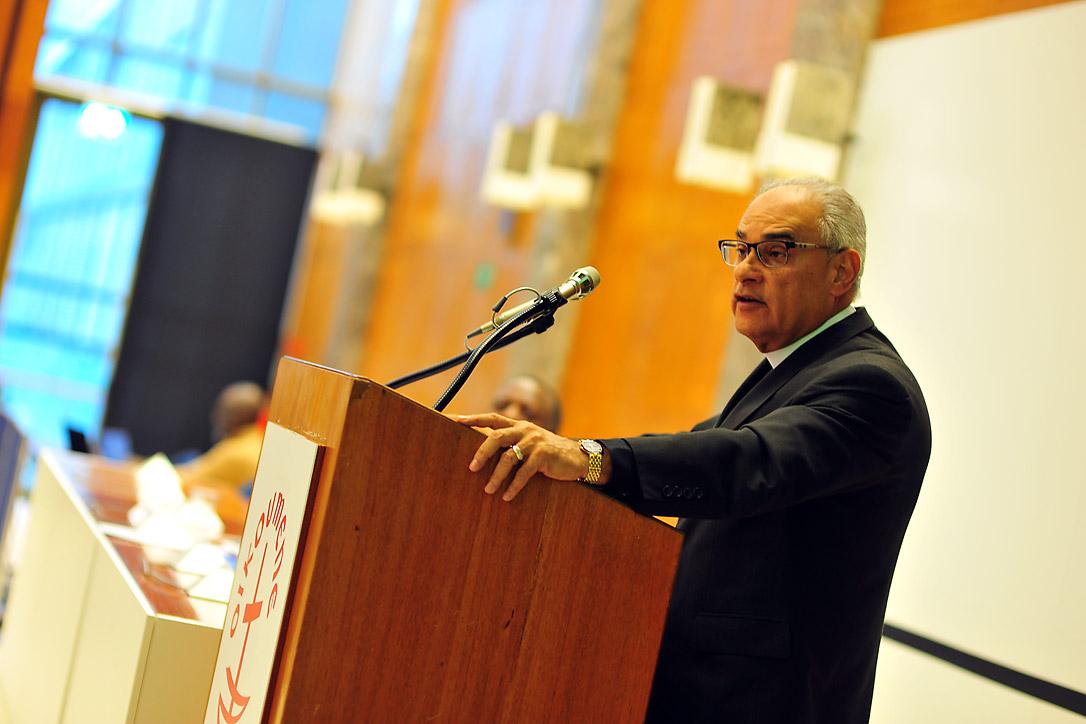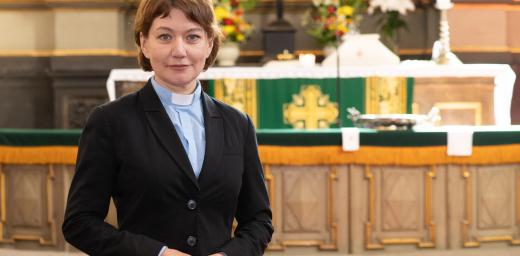Back to basics, bearing witness to God’s mission

Keynote speaker Rev. Dr Rafael Malpica-Padilla, director of Global Mission, Evangelical Lutheran Church in America. Photo: LWF/M. Renaux
Practitioners seek new strategies and collaboration for mission work in the LWF
(LWI) – Delegates at a two-day consultation of mission practitioners in The Lutheran World Federation (LWF) member churches and partner agencies have agreed to seek new ways of strategizing together in order to carry out the primary task of the church—bearing witness to God’s work in the world.
“It is time for us to go back to the basics, using whatever means are available. […] We cannot save anyone. It is God’s business. Our task is only to bear witness to it,” said Rev. Dr Fidon Mwombeki, director of the LWF Department for Mission and Development, summing up the 17-18 November event.
The 80 participants at the LWF Consultation on Contemporary Mission in Global Christianity mainly included mission work staff at congregational, national and international desks, heads of churches or synods, and lecturers at seminaries and universities. Around 20 mission agencies in Europe and North America were represented, as well as LWF member churches from these regions and from Africa, Asia, and Latin America and the Caribbean.
Mwombeki said the discussions had demonstrated the need for all churches in all LWF regions “to be ready to help and accompany each other with our different gifts and needs,” in spite of the different challenges. Referring to the theme of the consultation he emphasized, “Let us not be ashamed of the gospel; It is the power of God for salvation.”
In plenary and group discussions, delegates concurred that the rapid and extensive changes in society called for a redefinition of the concept of holistic mission. Many spoke of the need for conversation, for learning from each other and for intercultural cooperation in order to overcome past mistakes, and seek new ways of witnessing to the gospel.
In Africa and Asia, for example, the general trend of increase in Lutheran church members exists alongside a growing number of followers of neo-pentecostal churches that propagate a gospel of material prosperity, and higher numbers of non-practicing Christians due to growing secularism globally.
In Europe and North America, where church membership and attendance is in decline, new churches have opened, mainly started by migrants from different Christian traditions, and communities of people practicing other faiths. In Latin America and the Caribbean, regions also experiencing the impact of neo-pentecostal churches and movements, the Lutheran church and its institutions are struggling to survive and combine an authentic spiritual experience with charismatic expression.
Religious fundamentalism was identified as a common concern in all regions but with varying degrees, which raised questions about how best to strengthen Lutheran and Christian identity and forge dialogue and diapraxis with other faith communities.
A holistic vision of God’s mission
In the consultation’s keynote address, Rev. Dr Rafael Malpica-Padilla challenged the participants and the LWF to rethink engagement with the world from the perspective of a holistic vision. This calls the church to restore relationships and community as exemplified by Jesus Christ.
The emerging trends of migration and displacement, religious pluralism and the shift of the growth of Christianity from the northern to southern hemisphere presented not only challenges but also opportunities for Lutheran churches, said Malpica-Padilla, director for Global Mission at the Evangelical Lutheran Church in America (ELCA).
In this world of brokenness, Jesus’ project for life challenges the post-truth syndrome that denies personhood to the other, making them scapegoats for failed political agendas, economic under-achievements and many of the social ills in our countries.
He said the field of mission no longer only includes the traditional practice “from the West to the rest” but “reverse mission” was on the increase from countries such as Brazil, Nigeria and South Korea being the senders of the largest number of missionaries globally.
The movement of people, refugees and migrants also affects Christian demographics and mission work, he said. Citing a report from the Pew Forum on Religion & Public Life, he said Christians constituted most of the nearly 700,000 legal migrants in the USA between 1992 and 2012 and 80 percent of undocumented immigrants to date.
“Are we willing to open ourselves to the expertise of churches originating from the global south in the process of re-evangelizing our communities?” Malpica-Padilla asked. He noted there are LWF member churches in Europe and North America that have big diaspora congregations or established churches from regions in the global south.
Religious extremism
The ELCA Global Mission director referred to the 2003 LWF Tenth Assembly in Canada, to recall the role of Lutheran churches in the face of religious pluralism and extremism. “We must continue engaging in dialogue with other religions with a goal to seek understanding; build relationships of trust; co-exist peacefully and witness to the love of God for all people,” he said.
A further challenge for the church is today’s “post-truth” notion, in which emotion and personal belief are more influential in shaping public opinion than objective facts, Malpica-Padilla said. “In this world of brokenness, Jesus’ project for life challenges the post-truth syndrome that denies personhood to the other, making them scapegoats for failed political agendas, economic under-achievements and many of the social ills in our countries.”
The ELCA mission practitioner called for a rethinking of the church, its structure, preparation of leaders for its ministries, and resources to serve God’s purpose in the world.
Recommendations from the LWF Consultation on Contemporary Mission in Global Christianity will form part of the discussions at the May 2017 Twelfth Assembly in Windhoek, Namibia.





